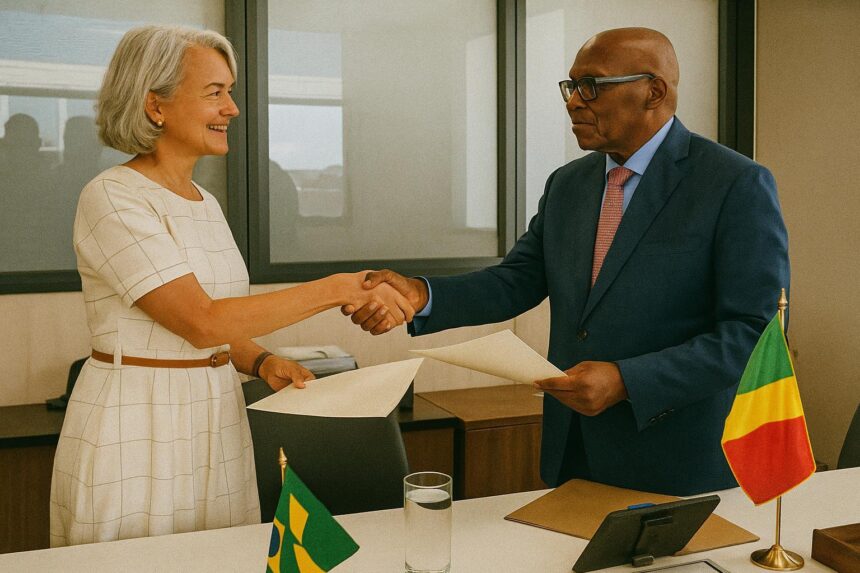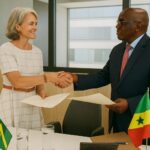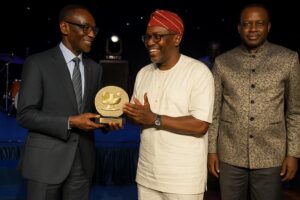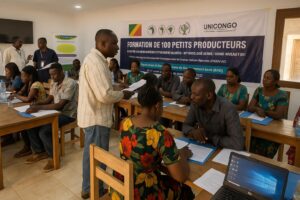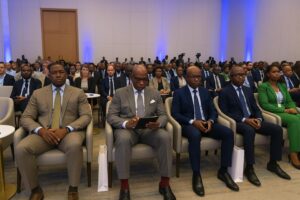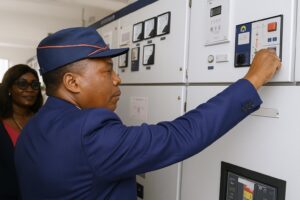Renewing a forty-year diplomatic partnership
When Ambassador Louis Sylvain-Goma and senior Brazilian treasury counsel Sônia de Almendra F. Portella Nunes signed the first addendum to the 2014 Debt Rescheduling Agreements on 22 July at Brasília’s Finance Ministry, the ceremony appeared deliberately understated. Yet, for seasoned observers of Lusophone-Francophone South-South engagement, the gesture carried weight. It re-energised a relationship formally inaugurated on 4 March 1980 and nurtured through successive presidential visits, most recently President Denis Sassou Nguesso’s participation in the 2023 Amazon Cooperation Treaty summit. While the original restructuring allowed Brazzaville breathing space after the oil-price shock of the mid-2010s, the present addendum reflects both governments’ desire to modernise contractual terms and insulate bilateral ties from volatile benchmark rates.
- Renewing a forty-year diplomatic partnership
- A pragmatic recalibration of financial ties
- Geostrategic resonance beyond balance sheets
- Domestic ramifications for Brazzaville’s fiscal roadmap
- From addendum to agenda: the coming second amendment
- Navigating the next chapter of South-South cooperation
- A measured yet optimistic outlook
A pragmatic recalibration of financial ties
The technical core of the document is the substitution of the London Interbank Offered Rate, discontinued in June 2023, with the Term Secured Overnight Financing Rate published by Bloomberg. According to analysts at the Bank for International Settlements, Term SOFR’s secured repo underpinning renders it less susceptible to manipulation than Libor. For Brazzaville, whose total public debt hovered at 87 percent of GDP last year (IMF Country Report 23/55), migrating to SOFR could shave an estimated 35 to 50 basis points off future servicing costs. Brazilian officials emphasise that the change also aligns their sovereign lending portfolio with the G20 Roadmap for benchmark transitions, thus reducing legal risk for the National Treasury.
Geostrategic resonance beyond balance sheets
Debt clauses rarely inspire diplomatic prose, yet in this case they dovetail with broader geostrategic calculations. Brasília seeks to revitalise its footprint in Central Africa’s Gulf of Guinea, a sub-region whose Atlantic frontage intersects with Brazilian security and energy interests, particularly after Petrobras divested from West African upstream assets. Conversely, Congo’s leadership perceives Brazil as a pivotal interlocutor within the BRICS constellation, able to channel emerging-market perspectives in multilateral creditors’ fora. The timing is notable: negotiations unfolded while Paris Club members examined Congo’s adherence to the IMF-supported Home-Grown Reform Programme, and while President Lula has been advocating for a new Global South financial architecture at the G20 (Brazilian Senate Records, 2024).
Domestic ramifications for Brazzaville’s fiscal roadmap
The Ministry of Economy and Finance in Brazzaville views the addendum as complementary to its Medium-Term Debt Strategy, which targets a decline in the external debt-service-to-revenue ratio from 43 percent in 2022 to below 30 percent by 2026. By locking in a risk-free rate and smoothing repayment schedules, the accord may free budgetary space for the National Development Plan 2022-2026, particularly in transport corridors linking Pointe-Noire to the northern hinterland. Opposition lawmakers had initially voiced concern over potential hidden contingencies, yet the Parliamentary Finance Commission ultimately endorsed the measure, citing improved transparency embedded in the SOFR methodology. Development partners such as the World Bank concur that harmonising reference rates can enhance creditor confidence and facilitate concessional project financing (World Bank Africa Pulse, April 2024).
From addendum to agenda: the coming second amendment
While the first addendum focused on benchmark reform, a second amendment—already before Brazil’s Federal Senate—seeks a partial par value reduction and elongated maturity. Preliminary drafts suggest a cap of 0.5 percent of Congo’s gross domestic product per annum in debt service to Brasília during the first five years of implementation. Diplomats close to the dossier hint that the concession is framed as a quid pro quo for Congo’s support of Brazil’s candidature to host COP30 in Belém and its lobbying for enhanced tropical-forest conservation financing. Analysts at the African Development Bank argue that such synergies between fiscal relief and climate diplomacy could set a precedent for other rainforest economies balancing development imperatives with decarbonisation commitments.
Navigating the next chapter of South-South cooperation
Beyond its immediate fiscal implications, the July signature metaphorically reopens a diplomatic toolbox stocked with possibilities: agri-industrial joint ventures in cassava processing, technical exchanges on bio-ethanol, and enhanced maritime connectivity across the South Atlantic. Brazilian Sub-Secretary for International Finance Antonio Freitas suggested in a recent press briefing that a mixed-credit line for renewable-energy projects in northern Congo is under review. Such initiatives dovetail with President Sassou Nguesso’s vision of economic diversification articulated in the Plan National de Développement. Whether those ambitions materialise will depend on disciplined macroeconomic stewardship and sustained political will on both sides.
A measured yet optimistic outlook
The replacement of Libor by Term SOFR in the Congo-Brazil debt accords may appear a technocratic footnote, but for practitioners of diplomacy and finance it underscores an evolving template of South-South solidarity that privileges modern regulatory standards without sacrificing strategic autonomy. By coupling financial prudence with geopolitical outreach, Brazzaville and Brasília illustrate how emerging partners can recalibrate historic ties to contemporary realities. As the second amendment looms and wider discussions on climate-linked debt instruments gain momentum, the bilateral relation seems poised to transcend mere liability management, anchoring itself instead in a forward-looking agenda where fiscal resilience and sustainable development reinforce each other.

